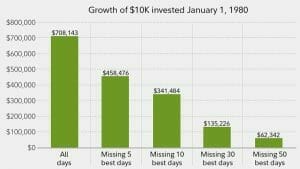
How the Stock Market Predicts the Future
Most investors invest for their future because they believe in a better tomorrow. It may be a comfortable retirement, a dream home or paying for their children’s college education. They look forward to the day they have enough money to see their objectives come to fruition. This year has been plagued with troubles; a global pandemic causing a global recession, a stock market meltdown followed by election concerns and social unrest. Fortunately for investors, the stock market looks past these near-term events and attempts to calculate the valuations of companies months and years in the future relative to their valuations today.
Anxiety from current events may cause people to have fear about the future rather than a hope for the future. This fear has many people putting off making decisions. There is an anxiety felt by people that permeates our social fabric. It is a juxtaposition that in the world’s greatest country where we should be living in peace and prosperity, we are living with tremendous uncertainty and trepidation about the economy, jobs, health, elections, government, communities and society.
By March of this year, it was becoming clear the US was going to experience a once in a 100 year pandemic. The COVID-19 coronavirus arrived at our shores and was spreading across the country. The response to the infectious spread was to shut down our society in order to limit our interactions out of fear for our health. The shut down led to a deep recession putting 30 million people out of work and the stock market dropping 30% in value in 30 days. Just as restrictions were being slowly lifted so businesses could reopen and the economy regain some footing, social unrest forced businesses in cities across the country to close again out fear for loss of life and property.
Prior to COVID, the US was experiencing a very strong economy with record low unemployment rates and a booming stock market. And even though COVID is still with us and there are still 22 million people out of work, stock markets have rallied to old highs. The stock market is already predicting a strong economy again in the future. It predicts that companies will reopen and rehire workers and customers will return.
How does the stock market predict the future? By looking at the past. Stock market observers have collected reams of data on pricing and valuations and with the luxury of hindsight, can put to together historical events and the effect on the stock market during that period. This information can be used to make certain assumptions about the stock market today. Professional money managers use assumptions when constructing portfolios for investors by applying the long-term capital market expected return assumptions for the future. These assumptions take into consideration historical returns during times of turbulence or peace, low or high interest rates and economic contraction or expansion. At Wiser Wealth, we combine historical data and forward looking long-term capital market assumptions to construct model portfolios designed to achieve our clients goals and objectives within the time frames allotted.
In the short-term, there will always be uncertainty in price fluctuations, but serious investors’ portfolios are designed for the long-term and the uncertainty of the near-term is ultimately resolved. It is our experience that when investors have a portfolio constructed to achieve a certain objective over the long-term, they are more willing to accept price fluctuations that go along with short-term uncertainty because they are confident the longer term approach produces better results. Studies have shown that attempting to time investments in the market to the movements in the market is a fool’s errand. Missing the five best days in the S&P 500 Index over the 38 years from January 1, 1980 through December 31, 2018 would cause an investor to have $250,000 less than they would if they had remained invested every day. Five days, $250,000 or $50,000 a day.
Sometimes things do go wrong. Take this year for example. No one saw the pandemic coming as we were going into 2020. No one was thinking about the novel coronavirus when they checked their year end account statements. Even though the stock market has come back, there still looms certain problems we need to keep our eye on. The possibility of an uncertain election outcome that lasts beyond our constitutional limits and the possibility that a vaccine for COVID takes much longer to be developed and approved. These events could cause a recurrence in the stock market we experienced earlier this year. However, assuming the election results are known fairly soon after election night and a vaccine is developed and approved, the stock market’s predictions will have come true.
America has the best business leadership in the world and there is no country with a better business climate for innovation and growth. Business leaders have learned to adjust and adapt to changing political and economic landscapes. Regulations, taxes, interest rates and presidential administrations are ever changing but stock prices of quality companies continue to rise over time and by investing, we are participating in the prosperity of America. We should not let the uncertainty of this year’s elections and the timing of a COVID vaccine cause us to be so concerned that it keeps us from making the best decisions for our future.
Brad Lyons, CFP®
Share This Story, Choose Your Platform!
Wiser Wealth Management, Inc (“Wiser Wealth”) is a registered investment adviser with the U.S. Securities and Exchange Commission (SEC). As a registered investment adviser, Wiser Wealth and its employees are subject to various rules, filings, and requirements. You can visit the SEC’s website here to obtain further information on our firm or investment adviser’s registration.
Wiser Wealth’s website provides general information regarding our business along with access to additional investment related information, various financial calculators, and external / third party links. Material presented on this website is believed to be from reliable sources and is meant for informational purposes only. Wiser Wealth does not endorse or accept responsibility for the content of any third-party website and is not affiliated with any third-party website or social media page. Wiser Wealth does not expressly or implicitly adopt or endorse any of the expressions, opinions or content posted by third party websites or on social media pages. While Wiser Wealth uses reasonable efforts to obtain information from sources it believes to be reliable, we make no representation that the information or opinions contained in our publications are accurate, reliable, or complete.
To the extent that you utilize any financial calculators or links in our website, you acknowledge and understand that the information provided to you should not be construed as personal investment advice from Wiser Wealth or any of its investment professionals. Advice provided by Wiser Wealth is given only within the context of our contractual agreement with the client. Wiser Wealth does not offer legal, accounting or tax advice. Consult your own attorney, accountant, and other professionals for these services.






